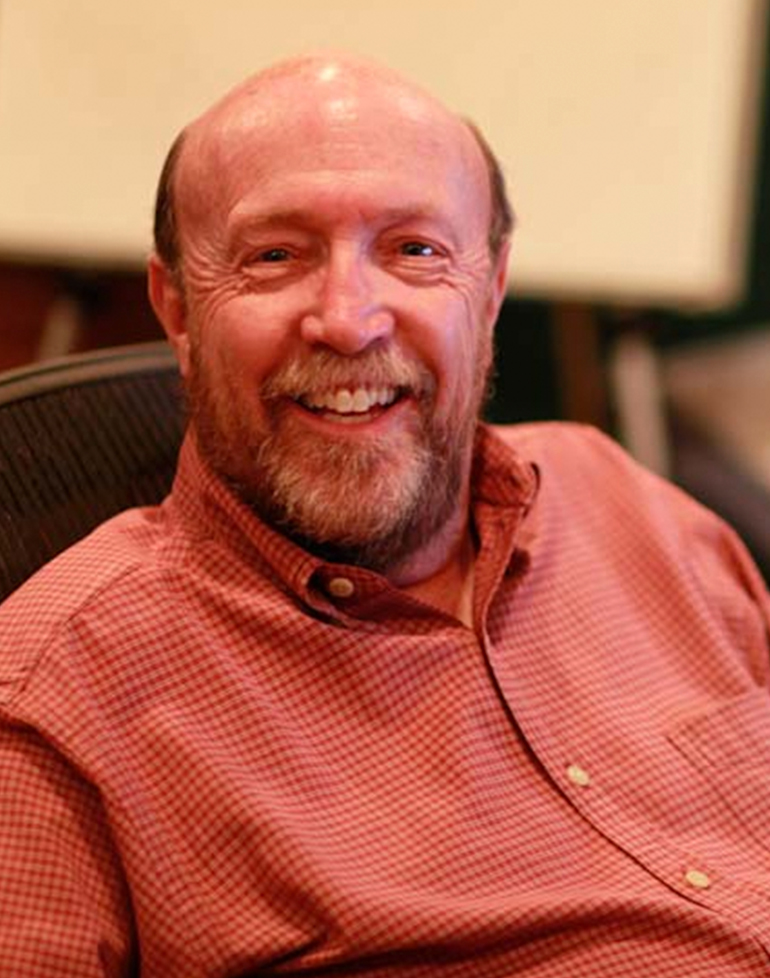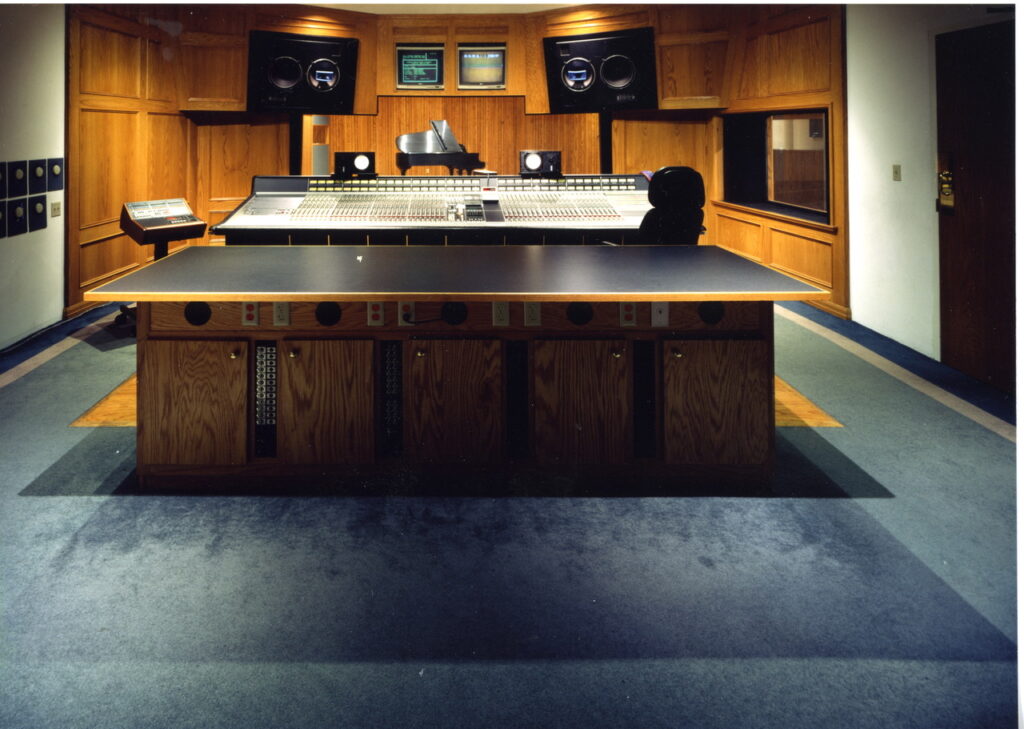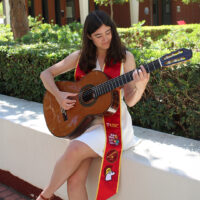
In Conversation with | Dick McIlvery and Fred Vogler
By Tyler Francischine

The IN CONVERSATION WITH | series uses the power of dialogue to profile the careers, accomplishments and relationships of USC Thornton professors and alumni.
If you call up Dick McIlvery (’80, MM ’82), he may relay an anecdote about his days as a studio guitarist, or maybe he’ll wax philosophical about his work as a recording engineer. Surely, you’ll hear about his exhilarating days teaching at the USC Thornton School of Music. As his history exemplifies, a lifelong career in the music industry requires wearing many hats and planning for all sorts of possibilities.
“To be in the music business, you have to be able to do a variety of things, because it’s never going to work out the way you think it is. It can work out well, but not the way you planned it,” says the professor in the USC Thornton music industry and music technology programs who retires this year after more than four decades of teaching. “I started off playing guitar. When I started going into the studio to record, I saw the console, all these knobs and things. When I’d watch the engineer change a knob, I’d look over his shoulder and think, ‘Wow. That looks like fun.’ I was also a copyist when they were copying music. I arranged some things. I wrote some music. The goal was always to be in the music business and to not have a part-time job at Starbucks.”

McIlvery’s passion for music – and guitar specifically – was ignited during his childhood in Los Angeles, where he spent each Saturday with his father listening to both classical music and country and western. He got his first taste of life inside a recording studio when he was just 16, playing in a surf music band that once opened for The Beach Boys at a local high school.
“They sat us down, put the mics up and said, ‘Okay.’ I said, ‘What do you mean?’ ‘Well, play something,’ they said. They just figured we would play something, they’d record it, and it would be a hit,” McIlvery recalls.
This early experience proved an important lesson for the future recording engineer, teaching him the amount of work it takes to record a song, let alone a hit, a process he later perfected with time, effort and experience.
“How long does it take to make an album? At least a week if you’re great players. I’ve done albums that took 12 weeks to record,” he says. “Slowly, you learn that from being in the business and being in the room where things are going on. That experience goes into your body and internalizes, and eventually you know without thinking what has to be done. That takes a long time.”
McIlvery has performed on or engineered the soundtracks for hit films and TV shows like Ace Ventura: Pet Detective, Why Do Fools Fall in Love, Beverly Hills, 90210 and Dr. Quinn, Medicine Woman. Reflecting on the opportunities and experiences he’s had behind his recording console, he feels nothing but sheer gratitude.
“You get to sit and listen. If you’re working at a high level with incredible musicians and you get to be in the room and listen to that, what could be better? And somebody’s going to pay you! Are you kidding?”

A band of brothers and sisters
At age 28, after establishing himself as a formidable guitarist and recording engineer, McIlvery began pursuing a degree in music at USC Thornton, studying studio guitar for his bachelor’s degree and later earning a master’s in classical guitar. After McIlvery graduated, Duke Miller, the then-chair of the Thornton Studio Guitar program, offered him a job to teach guitar, but McIlvery had another idea.
“I said, ‘Why don’t we offer a degree in recording?’ Duke said, ‘Well, you do it. We’ll put it out there.’ And so, I put it together,” McIlvery says of the brand-new USC Thornton Recording Arts degree program, which was established in 1985 and evolved into today’s USC Thornton Music Industry program. “Somebody showed up on my doorstep even before we got the program going. It was Mr. Fred Vogler. He ended up being the first graduate of the recording arts program.”
“I remember coming to that little room upstairs, the control room with the console, and sitting in on one of your classes. I thought, ‘Wow. This is something different,’” Fred Vogler (‘88) tells McIlvery.
Principal sound designer and front-of-house mixer at Walt Disney Concert Hall and the Hollywood Bowl, Vogler is a six-time GRAMMY winner for classical music recording and production who records the LA Phil, LA Opera, the Los Angeles Master Chorale and the Mormon Tabernacle Choir for commercial and broadcast release.
“The approach and the conversation were casual, so it felt very truthful. You were being really straight up. ‘Here’s what’s going to happen. Here’s how you all are going to have to adapt and how you’re going to have to learn,’” Vogler recalls of the first time he met McIlvery. “There was a supportive quality to it. As I’ve said to many colleagues and to younger people who are trying to get in the business, I wouldn’t be doing what I’m doing today if it wasn’t for Dick McIlvery and the USC Thornton School of Music. I feel really lucky.”
The pair established a bond that continues today, marked by mutual respect and a willingness to help the other in any way he can. McIlvery is hesitant to use the word ‘mentor’ to describe the relationships he’s developed with students. For him, it’s more like building a professional network that endures long after his students graduate.
“When you teach people, it’s not like you’re a bird and you kick them out of the nest and say, ‘Okay, you’re on your own.’ I’ve established a number of lifetime friendships and relationships. Fred was the first one and probably the longest one. We’ve done a ton of things together professionally and socially. We have dinner,” McIlvery says. “If he, or any of my students, ever needed help, I tell them all, ‘Send me an email, and we’ll get together and talk.’ It’s really a network that gets established as a teacher-student relationship and evolves to a professional-professional relationship. It’s not really a mentorship. It’s more of a band of brothers and sisters. We’re all in this together.”
Vogler, a former Thornton instructor himself, feels grateful for the training he received from McIlvery, namely for the wide range of skills he demanded of students, providing them with varied toolkits that came in handy for Vogler as he began his now-storied career.
“This program that Dick put together was very innovative. I had never seen anything remotely like it. It stressed musical abilities, so I had to take theory and composition. Then, I had to play with an ensemble, so I had to be comfortable enough with music to be able to read and follow scores. I also had to know how to solder cables and how to pass audio through mixing consoles,” Vogler says. “I hold onto that today. I think it’s partly what’s allowed me to work with a wide range of artists.”
Give them their start…and then let them go
When McIlvery accepted his first academic position, he thought it would be just a pit stop before returning to performing and engineering full-time. It ended up being one of the most rewarding experiences of his life.
“Here we are nearly 42 years later. I thought I would do this job until I found a good gig playing, and then I’m out of here. That never happened,” he says. “I never found a better job, something that excited me as much to get on the freeway and fight the traffic all the way to USC. That was an easy challenge to overcome because I knew when I got there, I was going to be able to teach these young people.”
During McIlvery’s tenure at Thornton, he owned and operated a major Los Angeles studio for 28 years. For 15 years, he put in more than 80 hours of work each week between the classroom and the studio. Because he had a concurrent career in the music industry while he taught, McIlvery imparted important lessons nearly in real time to his students.
“I’d go to school and impart this new material from what I had done that day or the night before, still warm,” he recalls. “Some kids would tell me, ‘Oh man, you’re always telling stories.’ I’d say, ‘Okay, the stories have a purpose, because these are experiences that you may end up with when you least expect.’ Experiential learning is really important.”

When contemplating the example that McIlvery has set for young students with dreams of conquering the music industry, Vogler says, “He successfully put together an academic approach and brought a sense of art to the technologies of recording. He promoted this with his heart and with all of his energies.”
As technology races ahead at breakneck speeds, there are some lessons McIlvery taught Vogler and countless other students that will always stand the test of time.
“Dick taught us that being honest and maintaining good relationships with the people who you come upon is essential. There may be times you disagree with people, but maintaining respect and taking other people’s perspectives into consideration is really important,” he says. “I think Dick has instilled in all of us who have gone through the program that we’re stronger as a group and network, not as competitors or some weird, divisive elements in the same industry. We’re all working toward the same goals.”
For McIlvery, it’s all just part of the job of ushering in the next generation of music industry professionals and steering them toward their wildest dreams and loftiest goals.
“Our job at the Thornton School of Music is to give students that broad base of knowledge, as many skill sets as we can cram in there and then let them go,” he says. “We give them their start, and they become successful on their own.”


